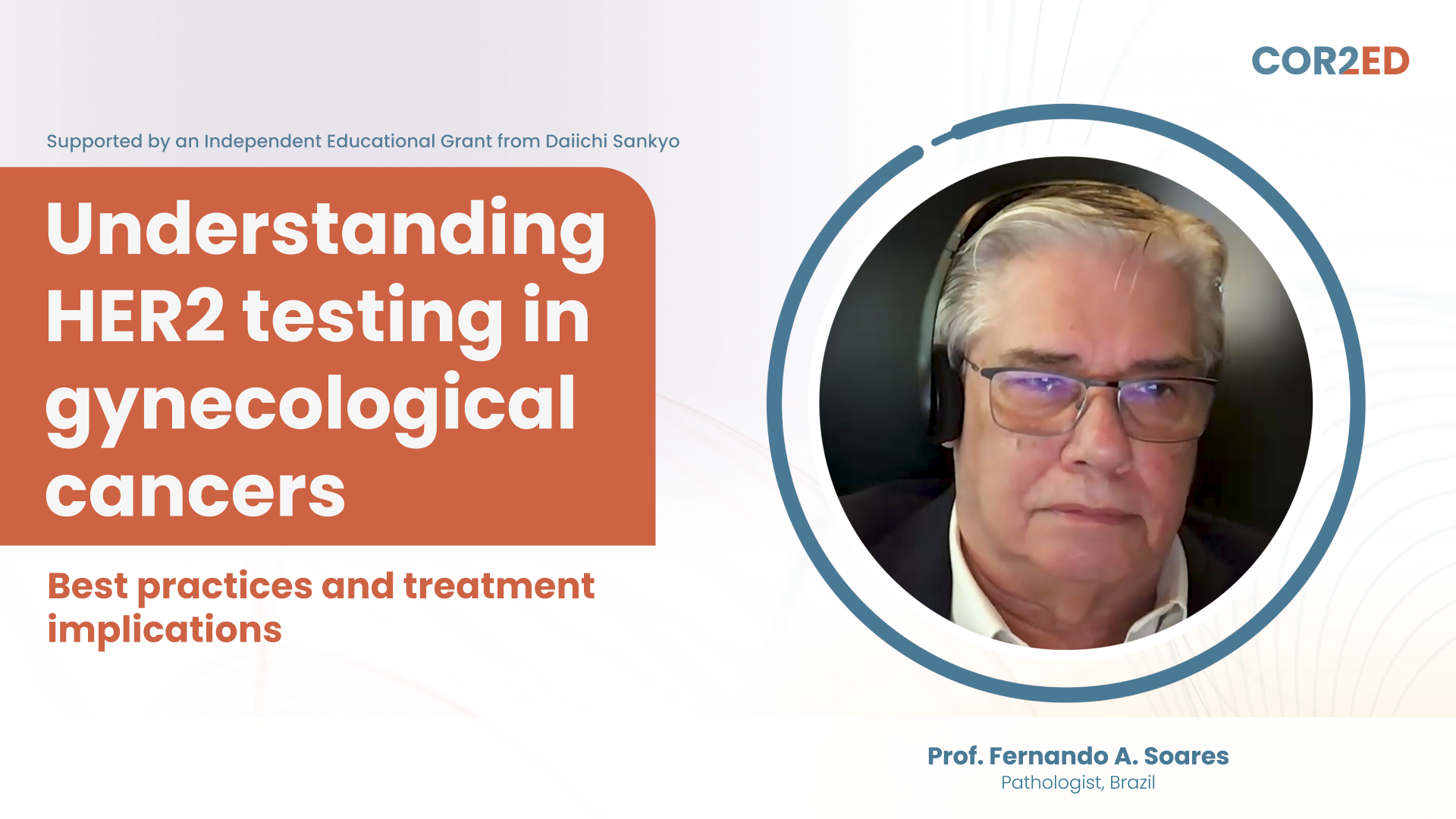Dr Alfredo Addeo - NSCLC
Hello, I'm Alfredo Addeo and I'm coming out of the Presidential session at the ESMO 2022.
I was present at two important studies. One is the CodeBreaK 200.
CodeBreaK 200 is a study for patients with KRAS G12C non-small cell lung cancer who progressed after the first line of chemo-immunotherapy treatment.
So it's a randomised study, long awaited results, of sotorasib, which is a KRAS G12C inhibitor, versus the chemotherapy docetaxel, which is pretty much standard of care across the globe I would say as a second line.
Now, the primary point was progression-free survival and the data has shown that there is an improvement in progression-free survival in favour of the sotorasib, that clearly showed to be better than docetaxel. It also showed a longer response rate of about 28% versus 13% for docetaxel. It is a bit lower perhaps than what we would expect given the data of the CodeBreaK 100, but nevertheless this is a positive trial. Maybe a bit disappointed that overall survival is not positive. Although it was a secondary endpoint and the study was not powered for detecting overall survival as the study was modified in 2022 because of the crossing that was allowed. Therefore they had to change the number of patients recruited, the trial was therefore smaller and it wasn't powered enough to show overall survival.
Anyway, I think this is a study that confirms that for patients harbouring this mutation, KRAS G12C, sotorasib is the new treatment to go.
The second study I want to mention to you is the IPSOS study. It's a study of immunotherapy treatment, so as a first line for metastatic non-small cell lung cancer. And there was a different group of patients within the study. So kind of a heterogeneous group. The vast majority were patients with a performance status of 2. There was also about 10% roughly of patients with performance status 3. And there were also patients with performance status 0-1, not eligible for what we call standard of care, which is the platinum-doublet based chemotherapy treatment.
So it was a phase 3 randomised study. The experimental arm was the immunotherapy atezolizumab, which is an anti-PD-L1, and the standard arm was the single chemotherapy treatment, either gemcitabine or vinorelbine. Now the primary endpoint was overall survival.
The study met the primary endpoint with a better overall survival compared to what is considered standard of care. Now we also have seen the sub-group analysis showing that the benefit was across subgroups, so irrespective PD-L1, irrespective of the ECOG. So patients with 0-2 or 2-3 somehow have a benefit from immunotherapy treatment.
Now although the trial is positive it clearly leaves us with a few questions, such as how do we interpret this data in real life? Could we start treating all the patients with immunotherapy treatment if they're not fit? And my personal take is we have to be cautious.
If you look at the curve there is an important crossing of the curve at the beginning, which means the patient selection was not ideal. I also believe that there was a bit of an imbalance in the study design and if you look at the patients with an ECOG 0-1, more patients were on immunotherapy and for patients with performance status of 3, more patient were on the chemotherapy arm compared to immunotherapy. Maybe this might have played, also, an important role.
Nevertheless, we need to acknowledge that this is the first phase 3 study that has also shown some benefit of giving immunotherapy in what we call an unfit population.
I think we definitely need to improve patient selection. I'm not sure I can start treating patients with performance status 3 and low PD-L1 with immunotherapy. And we will definitely need more data.
Dr Thomas Winder - CRC
Dear colleagues. My name is Thomas Winder. I'm a Medical Oncologist from Austria.
It's an honour and privilege to present to you today the NICHE-2 trial.
The NICHE-2 trial was presented at the presidential session at the ESMO 2022 meeting.
NICHE-2 is a neo-adjuvant immunotherapy trial in locally advanced colorectal cancer patients. So, they included in the intention-to-treat analysis 112 patients.
As you are aware around 10 to 15% of patients with locally advanced colorectal cancer are mismatch repair deficient. The recurrence rate of these patients is around 20 to 40 percent with standard treatment options.
So, in the NICHE-2 trial, they treated the patients in the neo-adjuvant setting with a combined treatment of nivolumab and ipilimumab followed by a single treatment with nivolumab followed by surgery.
The primary endpoint of the study was safety and efficacy defined by pathological response.
So now I want to present you the fascinating results of the study.
The study was safe and around 98% of the patients received surgery timely. And now the intriguing results on the pathological response. 95% of patients had a major pathological response and 67% of the patients had a complete pathological response.
These are intriguing results. They also presented the disease-free survival with the median follow-up of around 13 months, and there were no recurrences.
You need to keep in mind that in this setting around 40-50% of high-risk stage 3 colorectal cancer patients recur with standard treatment options. So, these results are really fascinating and potentially practice changing.
So, for the future they are now going to plan the NICHE-3 study maybe with a different immunotherapy compound and we are looking forward to these results. And we are looking forward to the further information we're going to get on this study, on the three-year disease-free survival, which we will await in 2023.
Dr Ray Manneh Kopp - Prostate cancer and RCC
Hi, I'm Dr. Ray Manneh and I'm coming to you from ESMO 2022 in Paris, right after the Presidential sessions and I'm going to give you my perspective on the GU abstracts that that were presented this year. There were three of them.
The first one is CheckMate 914 that tested nivolumab plus ipilimumab in the adjuvant setting for RCC patients after radical nephrectomy, and the trial didn't meet its primary endpoint of DFS.
The trial highlights the importance of this population and the need that we have to see the results of next trials. It will also increase our expectancy on the overall survival results from KEYNOTE-564.
The second one is the COSMIC-313 trial. It is the first trial to test triplet against doublet therapy. And it's the first trial that included a new standard of care in the comparison arm.
The trial tested cabozantinib plus ipilimumab + nivolumab against nivolumab plus ipilimumab. The study is a positive study. It showed a progression free survival advantage for the triplet therapy.
The OS results are still immature, but the toxicity profile is increased by the triplet therapy. We need more information to change our minds regarding the choice of first line treatment, and we will also need the results from other triplet therapy trials.
The third abstract was presented by Dr Parker from the UK and tested the need of adjuvant ADT after radiotherapy done after surgery for prostate cancer. The study tested two ways of ADT. None ADT versus short-term ADT and short-term ADT versus long term ADT meaning 24 months of ADT. The primary endpoint was MFS, metastasis-free survival. The study is negative for the comparison between none versus short-term ADT. This population was at really low risk of relapse after this radiotherapy, and it included population with adjuvant and early salvage radiotherapy. The other comparison was between short term ADT versus long-term ADT, and the results were positive, the intervention of 24 months on ADT increased the likelihood of being metastasis-free after 10 years by six percent.
These results show us the need of ADT for the worst population after radical prostatectomy.
In the clinical scenario, we will need to consider these results and compare with the other trials that were presented before.
That's all we have. We will give you more details about ESMO in further videos. Thank you.




 Downloadable
Downloadable  20 MIN
20 MIN
 Feb 2026
Feb 2026 






